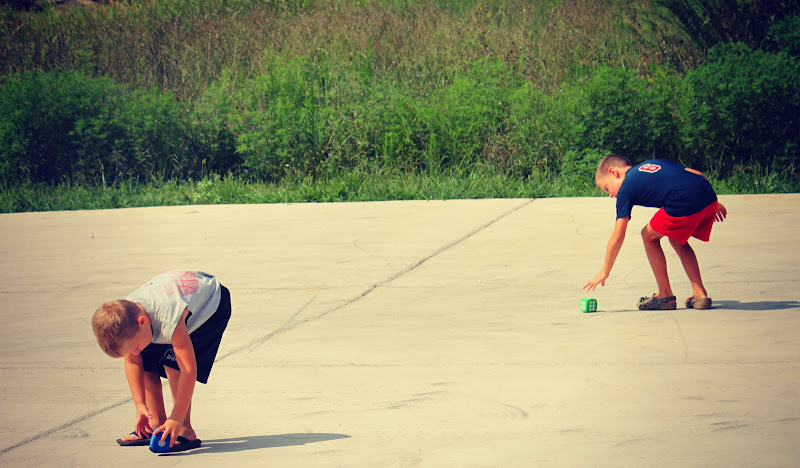Rollem
We like to move. Yep, this camp doesn't enjoy stillness so much. As the teacher mom big dawg in this thing we call homeschool, I make it a point to give the boys a happy mixture of movement and sitdownanddotheworkinfrontofyou. Balancing joy & pain is real world. I want to make sure that my guys get rockstar lessons big & fun, but I also want to be sure that they 'get' that sometimes paper work and the un-fun is a part of life. You know like sunshine & rain? I got the beat in my head, cats. Sing it if you know it. Pump it up. Pump it up. Give it to'em, Rob Base.
And, we kick it in the driveway with trend too. Don't you know neon colors are all the rage now? Here's how the beat goes: MATH. It's got lots of tiers and layers. It requires concepts like process and critical thinking. It can be heavy at times. Boys typically enjoy math more than girls. There. These are things I know from my background in education.
Now, here's what I know about math as a little girl who struggled with thinking I could even do it (Up until 8th grade, that is. Thank you, Coach Lamar Davis. You were the first teacher who ever told me I could rock math like no other. From that point on, I loved it. Positive words and good energy. Who knew it could make that much of a difference in a child's attitude?) Math. It's got some jazz to it. Think of it like a game. We do. We look at numbers like they're puzzles and play doh. They can be stacked, grouped and molded together to create something new just depending on how you wanna spin'em.
Our game. We call it Driveway Dice. We play it about once a week. For supplies, you will need some "osom" (Casey's spelling for the word "awesome". I'm starting to want to change its officially spelling in our house. I like 'osom' so much more than 'awesome'.) large foam dice from the DollarTree. We bought every color. You will also need 4 different color highlighters, a clipboard and whistle. Take a sheet of copy paper and put numbers in columns or rows as high as you want. I went to 18 for Casey and 32 for Eli.
Make a chart like so at the top of the paper.
Now, for the fun part. Each boy rolls the die on the driveway takes a set of dice and throws them as far as they can possibly throw. Then they have to add them together and put the corrected highlighted mark under the answer on their paper based on the chart at the top.
We do this for about 5 minutes. The boys are really quick at fast facts. Fast fact are simple fact families that are needed to know without using fingers or counting up in your head. These are the basic fact families from 1-12. How do you get good at learning fast fact families? Repetition. That's how.
One whistle blow from the big dawg (me) means that the boys now add another set of dice into mix. Then, the boys are adding larger numbers and charting whether their answers are even or odd. Believe it or not, the boys are becoming masterminds at even this. Eli especially. Casey is still working on his accuracy and quickness, but he is catching on nicely to this higher level adding.
The boys do this for about 7 minutes. Then, the big dawg blows the whistle 2 times. This signals the flip of the script. They are now subtracting with one set of dice. Pavlov Big Dawg has them trained to take a swig from their water bottles and toss their 2nd set of dice back into the tub before changing processes. They now are working on quick subtraction facts with one set of dice each and still continuing to tally their answers with their even/odd highlighter system. This goes on for about 5 minutes.
3 whistle blows means they add back the 2nd set of dice and subtract the totals of each set from the other to find the difference and then chart its answer in our neon even/odd way. This takes place for about 7 minutes.
Eli likes me to blow the whistle four times for him at the end. He then works on quick multiplication facts with one set of dice. As he does this, I am working with Casey helping him tally which numbers on his chart won in the following categories:
- Even Number Sums
- Odd Number Sums
- Even Number Differences
- Odd Number Differences
Casey likes to draw gold, silver and bronze metals for each.
When Eli is done with his multiplication round, we talk through his tallys. He uses the addition highlighters to tally his multiplication as he knows multiplication is just a faster way to add. I go one stop more with Eli in my math talking time. I ask him questions like "What is the highest double dice sum you could have gotten?" "What about the lowest double dice difference you could have gotten?" He loves these questions.
The entire lesson takes about 40 minutes. It's repetition. It's tiered in process levels and critical thinking. It's outside. It's moving. (Your welcome, Michelle Obama.) Most importantly, it has a theme song. We thank you, DJ EZ Rock and Rob Base.
Math.
.mac :)









